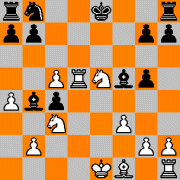10:42 PM Donner - Euwe, Winterswijk 1943 | |
In 1977, Donner wrote in Schaakbulletin: "Just having turned sixteen, I had been sent to the countryside to feed up a little. There was this girl, too. At our first acquaintance, she lifted her skirt and asked if she had beautiful legs. A future great artist would have reacted differently - Goethe, Wagner, Mulisch (a Dutch writer and a friend of Donner's - TK), but I was paralysed with fright. I did in fact become a chess player, just having mastered the art at that point. That weekend, she turned out to be God's daughter, as well. In unfathomable goodness he granted me a game. A Slav opening, he won the endgame."
5.a4 Bf5 6.Ne5 e6 7.f3 Bb4 8.Bg5 c5 9.dxc5 Qxd1+ 10.Rxd1 Nd5 11.e4 f6 12.exd5 exd5 13.Rxd5 fxg5 (see diagram) gone wrong; with 14.Nxc4 White would have obtained good chances. Now he was gradually put on the defensive. 14...Be6 15.Rd1 Bxc4 16.Nxc4 O-O 17.O-O Bxc5+ 18.Kh1 Nc6 19.Ne4 Be7 20.Rd7 Rab8 21.Na5 Nxa5 22.Rxe7 g4 23.Rd1 Rbd8 24.Rdd7 Rxd7 25.Rxd7 Rc8 26.Kg1 gxf3 27.gxf3 Rc1+ 28.Kg2 Rc2+ 29.Rd2 Rxd2+ 30.Nxd2 Kf7 31.Kf2 Ke6 32.Ke3 Kd5 33.Kd3 Nc6 34.b3 Nd4 35.h4 Nf5 36.h5 Ng3 37.h6 gxh6 38.f4 h5 39.Ke3 Nf5+ 40.Kf3 Kd4 and White resigned. The game, played without a clock, had lasted an hour.
Some time ago, to the disbelief of some readers, I mentioned that in Amsterdam, you can cross the Hein Donner bridge to reach the Max Euwe square. (See item 84 in this Diary.) It's something these two, who were for a long time Holland's only two grandmasters, could not have imagined when they first met in a family hotel in a provincial town in the East of the Netherlands, in 1943. | |
|
| |
| Total comments: 0 | |
